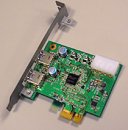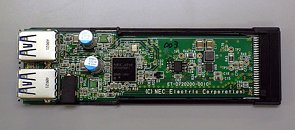- Joined
- Oct 9, 2007
- Messages
- 47,477 (7.50/day)
- Location
- Hyderabad, India
| System Name | RBMK-1000 |
|---|---|
| Processor | AMD Ryzen 7 5700G |
| Motherboard | ASUS ROG Strix B450-E Gaming |
| Cooling | DeepCool Gammax L240 V2 |
| Memory | 2x 8GB G.Skill Sniper X |
| Video Card(s) | Palit GeForce RTX 2080 SUPER GameRock |
| Storage | Western Digital Black NVMe 512GB |
| Display(s) | BenQ 1440p 60 Hz 27-inch |
| Case | Corsair Carbide 100R |
| Audio Device(s) | ASUS SupremeFX S1220A |
| Power Supply | Cooler Master MWE Gold 650W |
| Mouse | ASUS ROG Strix Impact |
| Keyboard | Gamdias Hermes E2 |
| Software | Windows 11 Pro |
NEC unveiled the first add-on cards based on its recently announced µPD720200 USB 3.0 host controller. This is the typical route taken by a company to propagate the standard in an environment where motherboard vendors and chipset makers haven't yet embraced it. For the desktop segment, the reference-design PCI-Express x1 add-on card provides two SuperSpeed USB 3.0 ports that are backwards-compatible with USB 2.0, 1.1, and 1.0. NEC also released an add-on card for notebooks, in the ExpressCard-34 form-factor based on the same controller, offering the same two ports. With these reference designs, NEC plans to propagate add-on card vendors to design their own cards based on the NEC µPD720200 controller. Typically, these cards should be priced around the $15~20 mark. A successor to USB 2.0, USB 3.0 offers 10-times the bandwidth (4.8 Gbps), although it will take a while for devices to use all that bandwidth, let alone support the standard. Perhaps this is why the company seems to find PCI-Express x1 sufficient as its system interface.


View at TechPowerUp Main Site


View at TechPowerUp Main Site








